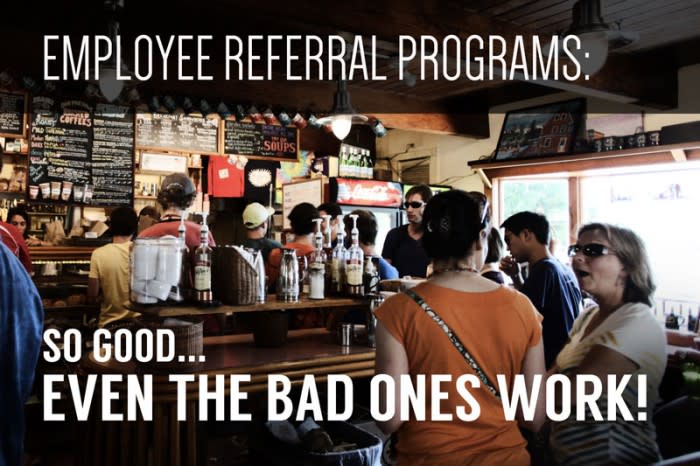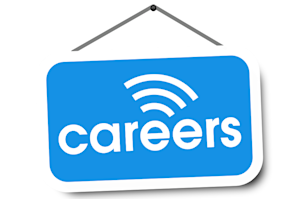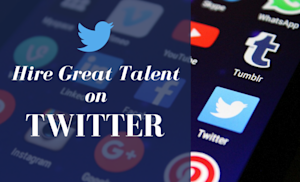
Employee Referral Programs Are so Effective That Even the Bad Ones Work!
What is an employee referral program?
For a simple definition of an employee referral program, I turned to BusinessDictionary.com.
Here’s what they had to offer:
“Recruitment method in which the current employees are encouraged and rewarded for introducing suitable recruits from among the people they know.”
All right, blog post done. That was an easy one…
If I left off this blog post here, the chances of it being successful (educational and shareable) are slim to none.
Yes, technically it answers the question: “What is an Employee Referral System?”, but it is far too basic, and adds nothing to the dialogue that would inspire or help you, or anybody else.
Unfortunately, many employee referral programs are built in a similar fashion.
According to employee referral program expert, John Sullivan, when it comes to employee referral programs, “most are pretty dull.”
Sullivan explains that this is because “many organizations task the management of their program to a loosely organized committee that rarely invests the time required to build anything more than a conservative, basic program.”
Just like I was tasking the development of my blog post to BusinessDictionary.com!
But, unlike boring blog posts, even basic employee referral programs achieve greater success than most other external recruiting sources.
That is how valuable employee referral programs are to an organization.
Even the bad ones work.
And the good ones?
Well-run, creative referral programs are on average twice as effective as basic ones.
Here are some key features that separate these excellent employee referral programs from the basic ones:
Employee Education
Great ERPs provide employees with the confidence and tools that they need to make quality referrals.
Teach your employees where to look for referrals, what to look for in a referral, and how to approach them.
Arm them with some stories about your company that sell your employer brand.
Provide them with a few basic script options to fall back on when they are unsure of how to approach a potential referral. Provide examples for phone, email, and social networks.
Clear Communication
Tell your employees exactly what you want from them, and why.
Be very clear about what you are looking for in potential hires, and the basic standards that referrals must meet in order to be considered.
Transparency
Employee engagement is mandatory for any referral program’s success.
To boost your employee engagement, make your ERP process transparent.
Keep them in the loop about their referral’s progress and status throughout the hiring process.
Social
Many of your employees no longer communicate with former classmates or colleagues in real life, but maintain relationships with them via social networks.
Your employee referral program must include a social element, which encourages your employees to reach out through these channels.
Odds are, if you do not encourage them to reach out through the internet, you’ll miss out on some of the best potential candidates.
Smart Compensation
The rewards you offer should be relative, enticing, and creative.
Offer small rewards for recommendations, and larger rewards for successful hires.
Add bonuses for job posts that are especially difficult to fill.
Instead of cash rewards, offer prizes, or even prize draws. Prize draws allow you to offer one very large reward. The chance of an exciting prize (such as a car, or vacation package) is often more motivating than the promise of a smaller one.
No matter what type of rewards you choose to give, make sure that a thank-you note is always a part of it.
Your employees want to feel like they are making a difference at work. Expressing to them that their referrals are an essential part of the company’s success can be even more rewarding than a cash bonus.
Measurable
ERPs must be easy to track.
If you aren’t tracking your employee referrals, then you won’t be able to run a consistent rewards program, dole out thank-you notes, or make data-backed strategy adjustments.
Great referral programs also make it possible for employees to track the status of the referrals they’ve made.
A quality employee referral program system, like Jobcast Social Referrals, makes it possible for employees to check in on the status of the referrals they make, and to assess which social networks are the most effective for referrals.
Check out John Sullivan’s site for more great information about employee referral programs.
Learn more about using social media and employee referrals.
Happy social recruiting!





